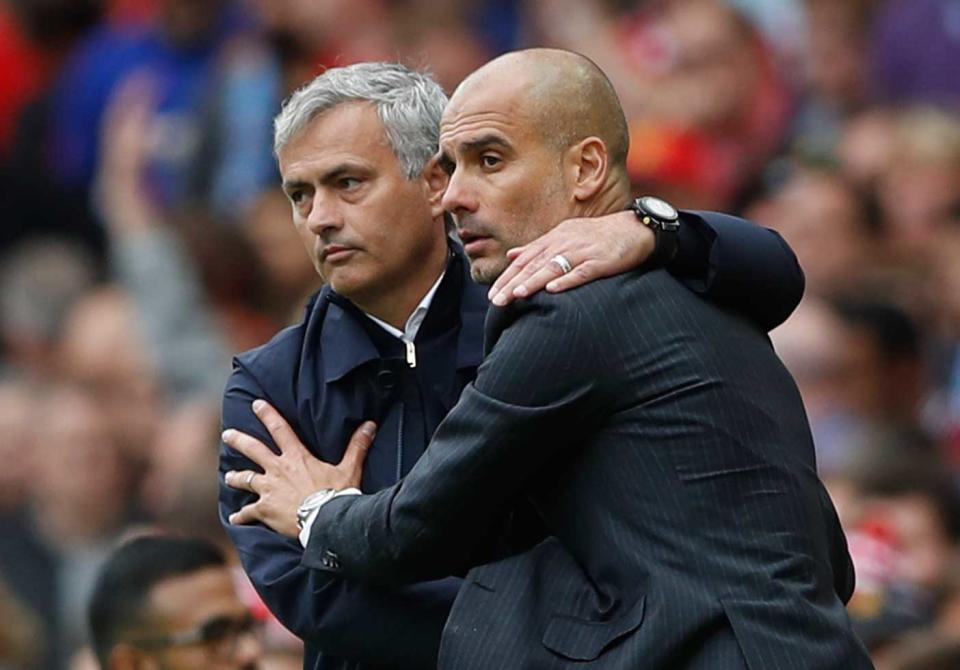What we learned from the Manchester derby about Man City, Man United

If you believe the managers are the painters and the players the paint, this age of the superstar soccer manager might make sense to you. But if the soccer field is the canvas, what really matters is the painting itself. It was easy to forget that in the buildup to Saturday’s Manchester Derby.
For weeks, the discourse had breathlessly droned on about the resumption of one of the fiercest managerial rivalries in memory, forged in the cauldron of Spain’s Barcelona-Real Madrid blood feud. Pep Guardiola and Jose Mourinho were indeed back in the same country, managing rival clubs, in the same city.
All this fevered anticipation presented Manchester United vs. Manchester City as a fight between one manager and another, with 22 players standing around and not having a whole lot to do with it.
We need to talk about everything that's wrong with modern football. pic.twitter.com/fuM6eTmKXY
— SportsJOE (@SportsJOE_UK) September 10, 2016
It’s a symptom of this era, when a handful of managers have proved so influential that club identities are instantly altered upon their arrival, right down to the DNA. Because Mourinho manages Man United now, that club can only be some kind of humanoid defensive machine, playing for results and very little else. And Man City have to be the continuation of Guardiola’s grand tiki-taka paradigm shift, replete with its possession fetish.
So once the game finally kicked off on Saturday, all eyes were on the two who had had endless run-ins in Spain. But they greeted each other warmly before and after the game. Like the friends they once were when Guardiola was Barcelona captain and Mourinho an assistant coach there, long before the latter was passed over and the totally inexperienced former became the new manager in Catalonia in 2008.
Jose Mourinho and Pep Guardiola embrace before kick-off.
Friends in the end. pic.twitter.com/DzUrLfNFqG
— Squawka News (@SquawkaNews) September 10, 2016
The only time either manager was notably involved, other than shouting and pointing a lot from the sidelines — as any new manager must in the first weeks at a new club — was when Guardiola had a brief grapple for the ball with United captain Wayne Rooney.
VIDEO: Pep Guardiola and Wayne Rooney clash during the Manchester Derby. Heated! https://t.co/kQdFTqmnUc pic.twitter.com/56halwzTOF
— Sport Vines (@SportVlnes) September 10, 2016
Ho-hum.
Rather than watch the sideline, the lack of antics and shenanigans forced us to observe the game itself. And the game was glorious. It served as a handy and overdue reminder that the reason Guardiola and Mourinho are so famous — and so successful — is because they are good at setting up soccer teams. Above all, Guardiola is adept not at being some kind of bald soccer Che Guevara but also taking a band of really good players and getting them to play a liquid and scintillating style. And Mourinho reads the game like few others, directing his teams to absorb opponents’ strengths and plunge quick jabs into their weaknesses.
It was nice to be reminded of all that. And we got to see each manager at his best.
In the first half, Guardiola’s City danced and passed circles around United as the visiting team applied suffocating pressure and then played an expansive and dazzlingly quick game with the ball at its feet. The Sky Blues’ two-goal lead was well deserved.
But Mourinho made adjustments before halftime, getting a goal back before the intermission and keeping the contest competitive. After the break, he inserted Ander Herrera to stabilize the midfield, where United had been overrun. And Marcus Rashford joined the attack to finally apply some pressure on City’s backs and prevent them from overloading United’s lines. So now City was rocked back on its heels.
Guardiola set up the aesthetic team and got the quick results earned from his game plan’s superiority. Mourinho adjusted and gained the upper hand in the late going. Just as you would predict it.
When the game was over and City had won it 2-1, a friendly handshake and man-hug ended the afternoon with nary a managerial incident. The game was about the soccer. Players apparently still matter, even when they’re less famous — or at least less obsessed over — than the men on the sideline.
And the soccer on display confirmed that both teams’ perfect starts to the season through three rounds of games were no fluke. City’s dizzying attacking, even in the absence of lynchpin striker Sergio Aguero, will be hard for anybody to stop, even if it slows down to 70 percent of its top speed over the course of a long and grueling season.
A more pragmatic United, liberated from the dogmatic Louis van Gaal, still has weaknesses and isn’t yet the finished article, for all the hundreds of millions in investment. But the Red Devils now seem much more adept at getting results than they have been in years, even this early on. Indeed, Rashford’s 92nd-minute winner in their last game at Hull City suggested the return of the Fergie Time magic that brought so many late spoils under Sir Alex Ferguson.
Still, if City wasn’t already the title favorite for having landed Guardiola and put him in charge of an already-gifted and further-reinforced side, the derby win confirmed it. Mourinho knew how to counterpunch and make it a game. Most other managers won’t. Nor will they have the players to match City’s when actual soccer is being played by soccer players.
Leander Schaerlaeckens is a soccer columnist for Yahoo Sports. Follow him on Twitter @LeanderAlphabet.



